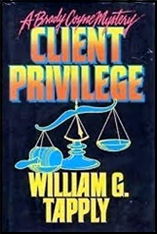Wed 2 Jun 2021
Archived Mystery Review: WILLIAM G. TAPPLY – Client Privilege.
Posted by Steve under Reviews[3] Comments
WILLIAM G. TAPPLY – Client Privilege. Brady Coyne #9. Delacorte, hardcover, 1990. Dell, paperback, 1991.
This is the ninth book to chronicle the adventures of Boston attorney Brady Coyne, and the first I’ve happened to read. Some general impressions in a minute, some favorable, some not, but let’s get to the story first.

A long-time friend of Brady’s, about to be nominated to become a federal judge, asks him to act as his legal representative in a matter of blackmail. When the blackmailer turns up dead (no surprise), Brady is prevented by the doctrine of “client privilege†and his own stubborn sense of ethics from revealing to the police anything he knows about the case.
And by refusing to talk, he quickly becomes suspect himself. This is all very predictable, so much so that it is greatly surprising that Brady Coyne doesn’t see it coming himself. This is not Brady’s first brush with a murder investigation, yet after the first interview he has with the police, he tells his client, “I feel so – so guilty. They asked me these questions, and I couldn’t answer them very well, and somehow they made me feel as if I had done something wrong.â€
Perry Mason was never such a wimp. Something is wrong here. Coyne has a lot of wealthy clients and he makes a lot of money, and I think I know more law than he does. [WARNING! From this point on, I’m going to be going over details of the story you might not want to know without having read the book first.]
Case in point: He’s later moaning over the fact that he has all this information about the case, and he can’ tell anyone. Client privilege. My response, “Hire a lawyer yourself.†A while later, that’s exactly what he does. He tells the other guy everything.
Second case in point: He’s trying to find the woman in the case, but he’s stumped when he discovers she has married in the meantime and he doesn’t know her new last name. After a while his ex-wife has a brilliant idea. “There are records, aren’t there? When someone takes out a marriage license?â€
Perry Mason was never as inept as this. And it never occurs to Brady Coyne that it may be that his client is guilty until some 100 pages have gone by, and it occurred to me as soon as the murder was announced. Well, all right, the guy is a friend of his, and who’s going to believe that of a friend? On the other hand, as soon as he does start to think it over, he’s convinced the guy is guilty, and right away he’s trying to find ways to get out from behind “client privilege†without actually saying anything to the cops himself.
So he starts investigating on his own, but in doing so, leaving a trail behind him so wide that both the police and the media can follow without breaking a sweat. Is it any surprise that the girl in the case is soon found half beaten to death? It is to Brady Coyne.
Perry Mason was never of such doubtful intellect as this. Or so disloyal to his friends. I certainly would not care to have him representing me, strong code of ethics or not.
On the other hand, while the story is so nicely predictable, Tapply is a tremendously smooth writer, with ace-high dialogue throughout the book. Even though I took a moderately strong disaffection for his hero – maybe I don’t identify with yuppies very well – I found myself tearing through the book, caught up in the tale and the need to discover how it dame out.
All in all, though, in summing it up, what I think I’ll remember most about this book is that it should have made a a lot more use of Tapply’s top-notch storytelling talent than it does.
June 2nd, 2021 at 6:39 pm
Smooth writer yes, but not so smooth a plotter. It is much harder to write a thriller with a dumbed down hero than a smart one. If Coyne was shown as something of a dummy stumbling to the right soulution it would be much better, unfortunately he’s supposed to be smart and capable, and instead seems less aware of the law than the reader.
June 2nd, 2021 at 8:35 pm
Given all the unfavorable comparisons I made in this review regarding Brady Coyne vs. Perry Mason, this was, strangely enough, not a terrible book. Other readers loved the series. There were 25 solo Brady Coyne adventures, and three more with him teamed up with Philip R. Craig’s J.W. Jackson. Jackson was a guy strongly in the semi-mediumboiled Spenser mode, and I’ve wondered what the combination of the two would be like.
I guess one way to find out would be to read one. Add it to my list!
June 3rd, 2021 at 6:46 am
I was going to mention that the only Coyne books I’ve read were the collaborations with Craig set on Martha’s Vineyard. Although Coyne participated, they were very much Jackson books. I was a fan of that series, I read them all, so naturally I read the collaborations as well.
I don’t think I’ll be reading any solo Brady Coynes.